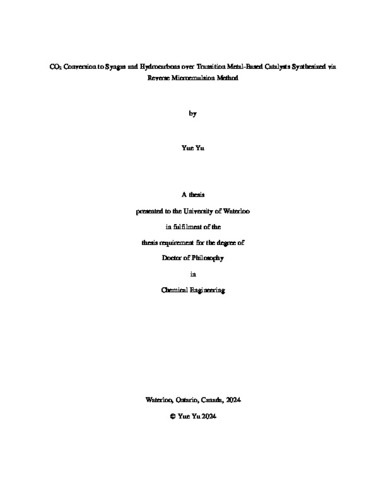| dc.description.abstract | This thesis offers a comprehensive exploration into the development, exploration, and practical implications of various catalysts, with a particular focus on their performance and critical roles in the efficient and sustainable conversion of CO2 through thermo-catalytic processes. In particular, this thesis focused on the exploration of potential catalysts for CO2 conversion and hydrogenation processes including various catalyst systems such as Co-Mo carbides and oxides, Fe/Al2O3, and CeO2-based materials. The study combines experimental and theoretical approaches to discover new insights and avenues for catalysis development. In the study of Cobalt-Molybdenum oxide and carbide catalysts for the reverse water gas shift (RWGS) reaction, the studies conducted in this thesis identified promising activity at specific conditions but also highlighted the need for further improvements in carburization and synthesis processes. The investigation into Al2O3-supported iron catalysts for CO2 hydrogenation reveals that the RME Fe/Al2O3 catalysts, prepared through the RME method, exhibit superior performance, particularly in terms of CO2 conversion rate and selectivity towards C2+ hydrocarbons. This finding underscores the importance of synthesis methods and reaction conditions in catalytic performance. Moreover, the study conducted on CeO2-based catalysts for RWGS showed that Cu/CeO2 and Fe/CeO2 catalysts synthesized by reverse microemulsion method are favored in CO2 reduction to CO, maintaining high selectivity to CO across a broad temperature range. This is attributed to the effective doping with transition metals like Cu and Fe, which enhances CO2 adsorption on CeO2 surfaces, also underscoring the significant role of oxygen vacancies generated by doping in CO2 adsorption and activation. These insights paved the way for a more nuanced understanding of the factors influencing adsorption and subsequent catalytic activity. These findings contribute significantly to the field of catalysis, providing a robust foundation for developing more efficient and resilient catalysts for RWGS reactions and CO2 conversion. The novel integration of experimental and computational methods in this thesis offers a comprehensive understanding of the catalytic processes, setting new benchmarks for catalyst design and advancing sustainable energy initiatives. This thesis integrates theoretical research with practical application, providing insights and guidelines that hold substantial promise for the future of environmental sustainability and efficient, selective CO2 conversion processes. | en |

